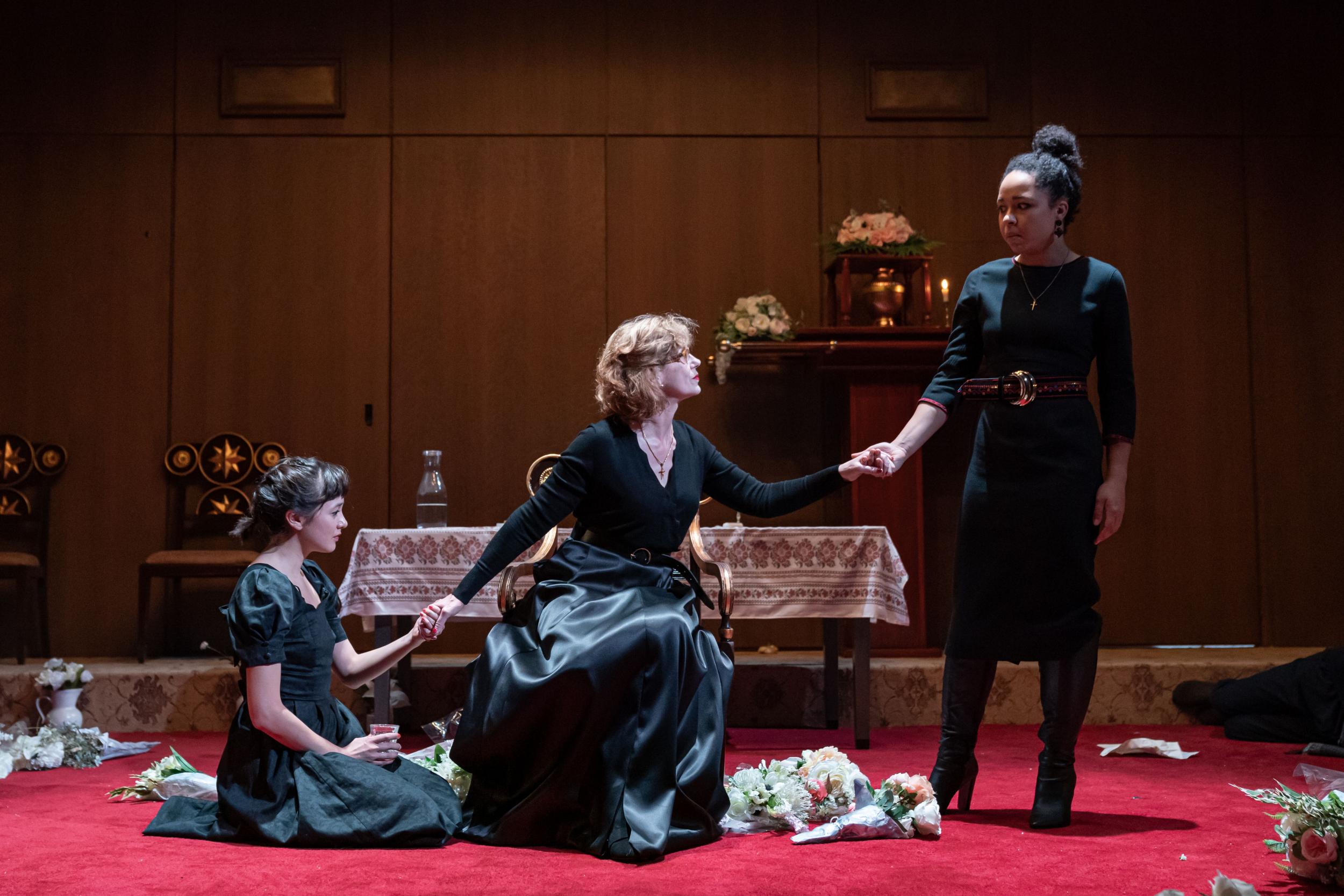Vassa, Almeida Theatre review: A vivid, horribly vital production
Siobhan Redmond shines in this disgracefully funny adaptation of Maxim Gorky’s 1910 play

Two planks are lowered on to the stage at the start of Mike Bartlett’s disgracefully funny adaptation of Vassa. They descend in deadpan sequence. One reads, “This play is set before a revolution.” The other, after a mock-solemn fade, “Capitalism is showing its age.”
Not the revolution, note. Experience suggests that revolutions are inclined to devour their young. Written after the failure of the 1905 Russian revolution, when the Imperial Guard fired on a peaceful demonstration, causing many fatalities, Maxim Gorky’s 1910 play is a savage reminder that capitalism too is no slouch at tearing itself apart greedily. It is this gleefully baleful early version – published but never performed at the time – that Bartlett has adapted, and not Gorky’s 1936 revision.
This vivid, horribly vital production at the Almeida, directed by Tinuke Craig, suffered a setback when Samantha Bond was forced to withdraw from the role of Gorky’s eponymous matriarch. But Siobhan Redmond proves to be a remarkably adept and undaunted replacement. She has always been able to take a line of dialogue and perform several nifty three-point turns within it, with that severe, insinuating Scots accent of hers.
The character of Mother Courage (from German dramatist Bertolt Brecht’s 1939 play Mother Courage and Her Children) is thought to be the ultimate example of how maternal feeling can be tricked into betraying its own best interests. But Vassa makes the entrepreneurial Mother Courage look like Mother Teresa. Here, Redmond brings to richly sinister, wrong-footing life the breathtaking intricacies of Vassa’s tireless suppression of her conscience. All in the interest of keeping the failing family business intact. She also subtly conveys the human cost to Vassa of this noxious knack for bullying, browbeating and sexually blackmailing her tangled, merchant-class brood into obeying her will.
Gorky’s 1936 version of the play reshaped the piece so that it toed the line with the changed political regime. Vassa’s family got an upgrade so that they could represent the wealthy class enemy and were freshly equipped with a revolutionary opponent. Bartlett sets to work with gusto on the original, which shows the warping effects of becoming preoccupied with inheritance. Vassa’s sons want to cut their fiscal ties to her and the family business.
Mainly comprising a row of wooden doors, Fly Davis’s design pointedly references the sets used in the Roman farces of Plautus and others. The multiple exits and entrances here are blackly funny and are executed with great comic timing by the crack cast. The unholy amusement comes from the contrast between the usual breakneck farce and the fretful, self-absorbed behaviour of this lot. They smoulder at the emotional chaos Vassa has caused, by attempted poisonings or providing matrimonial camouflage for nasty cases of underage sexual exploitation.
Vassa declares to her daughter Anna that all mothers are sinners. In the end, she will explain herself to the Blessed Virgin Mary, the archetypal matriarch, “and she’ll understand! She pities evil mothers like you and me.” When her husband finally succumbs to assisted dying, Vassa produces a fake will which leaves sole control of the family business to her. A disabled son is shunted into a monastery so that he can avoid the police, after being framed for causing the death of his uncle. Vassa may be overestimating Mary’s talent for forgiveness.
Danny Kirrane is particularly funny as Semyon, wheezily laughing at the others with a misplaced sense of sophisticated superiority, and masticating certain words with relish as though he were chewing the cud.
As with David Hare’s recent adaptation of Ibsen’s renamed Peter Gynt at the National, I sometimes wonder if Bartlett’s sheer cleverness is too on top of the game, to the point of alienating some punters. There’s a sense that the show is glorying in the amorality, in the end, rather than lethally castigating it. But the whole evening yammers with talent.
To 23 Nov, tickets and information at almeida.co.uk
Join our commenting forum
Join thought-provoking conversations, follow other Independent readers and see their replies
Comments